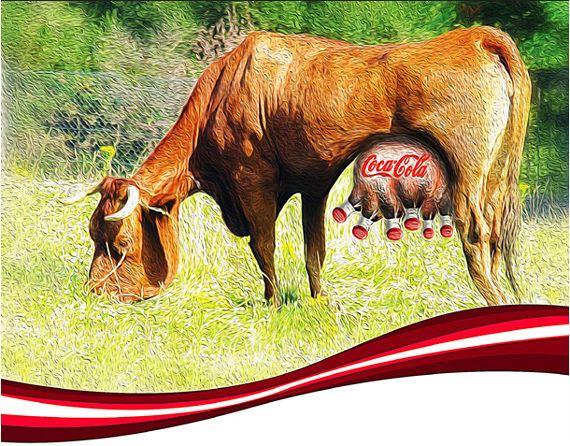PepsiCO has taken the lead in the beverage industry as it has become diversified
through different related activities, thus holding a larger portfolio than its
all-time competitor, The Coca Cola Company, which seems to be taking action in
that sense.
Coca Cola FEMSA
(KOF) is the leading bottling company for the Coca Cola brands
worldwide. As per its webpage, 52 per cent of the company is owned by the firm
Fomento Económico Mexicano SA de CV (FEMSA), 30.6 per cent
corresponds to subsidiaries of The Coca-Cola Company, and 17.4 per cent
is owned by public investors.
FEMSA
entered the big league in 2003, when it acquired all of PANAMCO. This
enabled it to go beyond the Mexican borders and is now present in nine
Latin American countries.
In
2007, the acquisition of the second largest producer of juices in Mexico,
Jugos del Valle, allowed the start of operations in the segment of
non-carbonated beverages.
This
enabled FEMSA, and obviously The Coca Cola Company as well, to
make their incursions into a policy of “horizontal integration” which includes
the acquisition of or merger with companies from that industry, aimed at
increasing their variety of products and also at benefitting from competitive
advantages within the market.
From
Panama to Mexico
Last
year, FEMSA raised its bet and became part of the dairy industry as it
acquired the group Grupo Industrial Lácteas (Estrella Azul),
the greatest dairy group in Panama, which in 2010 accounted for 140.9 million
dollars in revenue.
A
few weeks ago, FEMSA was on the news again as it acquired the Mexican
firm Santa Clara, where approximately 200 thousand liters of milk are
processed daily, 75 per cent of which are applied to fluid milk.
México ranks eighth in worldwide milk consumption and has yearly sales of
approximately 7,000 million dollars.
The
market is held by a controlled by a reduced number of competing companies: in
ten glasses of milk consumed in the country each day, five come from the firm
Lala, three from Alpura, and the other two from other companies.
As
per the National Livestock-raisers and Dairy Producers Association (the
ANGLAC), the yearly production of milk in México is 10,700 million
liters, and imports
̶̶
mainly from the U.S., where production is subsidized
̶̶
represent approximately 31 per cent of the national consumption. .
According to the ANGLAC, the yearly demand amounts to 13,500 million liters and
the imports of powder milk amounted to 226,779 tons only in 2011.
The
NAFTA and the dairy industry
As
it happens in other countries, dairy producers in Mexico are working at a loss.
“The return obtained by producers in this sector as compensation for supplying
the federal government and manufacturers is not enough. The highest possible
figures only reach 5.62 Pesos per liter, whereas the cost of production is 6.30
Pesos"(1).
|
In ten glasses of milk consumed in Mexico each day, five come from the
firm Lala, three from Alpura, and the other two from other companies.
|
México
currently faces an atrocious drought and needs to import a significant portion
of the raw material applied to feeding cattle. The cost of fodder represents 70
per cent of the total.
As
per Armando Paredes Arroyo Loza, President of the APAL Group (a
milk producer), “Years ago, the ton of wheat rounded 3 thousand Pesos, while
in the past three years the increase has reached 200 per cent”.
The
crisis is so profound that from the estimated 200 thousand production units
existing in the country around 50 thousand will disappear by the end of 2012,
and as a result of the drought, between 500 thousand and one million less
liters will be produced daily(2).
What
has caused this situation?
Álvaro González,
leader of the National Movement of Milk Producers and Consumers, has informed
that “Mexico’s food crisis started 18 years ago with the subscription of
the NAFTA which granted privileges to the dairy industry benefitting it with the
waiver of taxes of over 4 thousand million dollars, for the 14-year deregulation
period. There was also the authorization of imports of milk subsidized in the
country of origin.”
|
PepsiCO
The company continues to grow in the dairy sector and will now
commercialize yogurt in the U.S., as part of a joint venture with a
German company. |
“The fact is that Mexico is the country with the highest level of dairy imports
in the world, as a result of the North American Free Trade Agreement,”
expressed the President of ANGLAC, Vicente Gómez Cobo. .
Concerning FEMSA and its latest acquisition - Santa Clara -, the
200 thousand liters of milk produced daily should not be a matter of concern to
competitors, though it is also true that the Group is extremely powerful in the
art of getting control of other companies.
Another possible scenario would be FEMSA importing dairy products from
the U.S., the country of origin of 72.9 per cent of all imports during
the first six months in 2012(3).
This would allow for the supply of the almost 10 thousand branches of
OXXO that it owns, Mexico’s largest convenience store chain (with an
area of less than 500 m², and business hours exceeding 18 hours a day). Surely
time will tell.
Reality has shown that upon saturated markets, the leading trans-national
companies are in search of new segments and are gradually taking over the whole
spectrum.
The
eggs are now in several baskets, and this will continue to happen until all eggs
and all baskets become the property of a single trans-national company.
Apparently this will be happening sooner than later.
